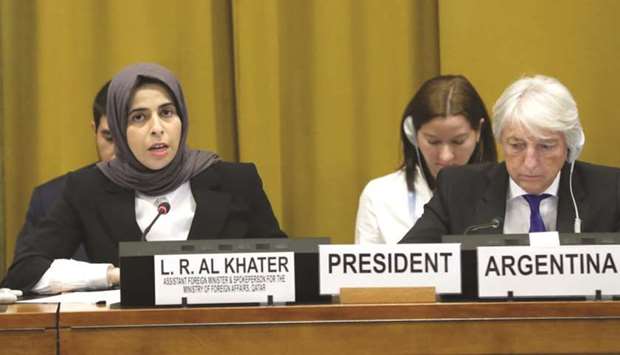Failure to establish a Middle East Zone Free of Nuclear Weapons and Other Weapons of Mass Destruction based on the 1995 resolution will increase tension, instability and hinder the attainment of peace and the path to sustainable development in the region, HE the Assistant Foreign Minister and Spokesperson for the Ministry of Foreign Affairs Lolwah Rashid AlKhater, said yesterday.
Delivering a statement at the High-Level Segment of the Conference on Disarmament (CD), HE AlKhater said failure to establish such a zone in the Middle East will affect the credibility of Non-Proliferation Treaty, the review process, the entire non-proliferation regime, and will also call into question the intention of nuclear States to establish a zone free of these weapons in the Middle East.
HE AlKhater underlined that Qatar pursues a clear and unwavering national policy on disarmament, which reflects its positions underpinning peace, in the belief that all efforts on disarmament in the world need to be supported. This would also preserve the environment, avert the risk of nuclear weapons and weapons of mass destruction falling into the hands of terrorist and extremist groups and it would as well remove the fear that disturbs the human existence.
HE AlKhater said: “The State of Qatar has acceded to various major international disarmament conventions and passed the necessary national legislation to ensure their full implementation. Since its establishment in 2004, Qatar’s National Committee for the Prohibition of Weapons remains engaged in providing advice to competent government authorities on issues of arms embargo and disarmament, working towards achieving the objectives set forth in the relevant international convention to which the state has acceded and developing plans and programmes to raise awareness and education on disarmament dimensions”.
She noted that the National Committee is keen to consolidate its relationship with organisations and stakeholders concerned with disarmament on the basis of professionalism, credibility and transparency. The Committee has been hosting numerous conferences and seminars on disarmament, in co-ordination with the Doha Regional Centre for training on agreements related to weapons of mass destruction that was established in December 2012, and which is the first of its kind in the Middle East and Asia.
“The States Members of the Conference on Disarmament, especially at this difficult and complex time with increase threats and crises, have a primary responsibility to break the deadlock in the conference. It is important to demonstrate political will and flexibility to reach a balanced and comprehensive work programme that takes into account the security concerns of all countries, consistent with the rules of procedure of the conference. Otherwise, the credibility of the conference, its role as the only multilateral forum for negotiating disarmament as well as its ability to support and enhance international peace and security, would be doubtful,” HE AlKhater said.

HE the Assistant Foreign Minister and Spokesperson for the Ministry of Foreign Affairs Lolwah Rashid AlKhater, addressing the High-Level Segment of the Conference on Disarmament in Geneva yesterday.
